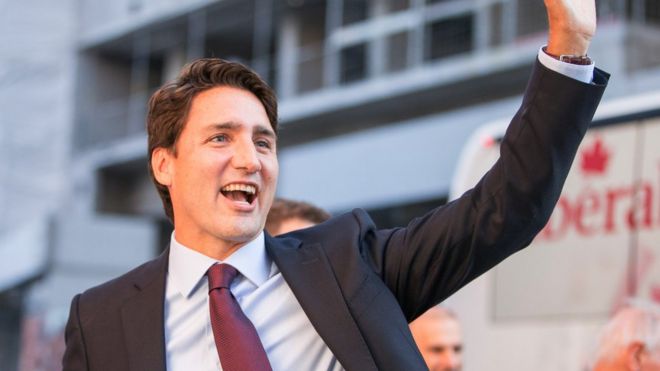
Justin Trudeau is on course to become the next prime minister of Canada. So, who is the Liberal leader and what change will he bring to the country?
During one of the longest elections in Canada's history, the 43-year-old was derided by opponents as an inexperienced "pretty boy" who was "just not ready" to govern. But after almost a decade of Conservative rule, Mr Trudeau convinced voters he can "bring real change". It's been a remarkable political turnaround for his party and a fascinating rise to power for the eldest son of the former prime minister Pierre Elliott Trudeau
Born to lead
When Justin Trudeau was just four months old, then-US President Richard Nixon predicted the infant would one day follow in his father's footsteps.At a gala dinner during a state visit to Ottawa in 1972, Mr Nixon addressed his Canadian counterpart: "Tonight we'll dispense with the formalities. I'd like to toast the future prime minister of Canada: to Justin Pierre Trudeau."
According to CBC, the elder Trudeau responded that should his son ever lead the country, "I hope he has the grace and skill of the president."
While Mr Nixon's political career, of course, ended in disgrace, Mr Trudeau went on to dominate Canadian politics until the mid-1980s, provoking passionate and polarising opinions.
His first election in 1968 inspired a frenzied fandom among young voters that became known as "Trudeaumania". And his administration included many historic accomplishments like making both French and English the official languages of the federal government.
His own path
Justin lived much of his childhood in the public eye. The family's security detail gave him the codename "Maple 3".But as he grew up he shied away from politics. He attended McGill University then the University of British Columbia, where he earned a degree in education. He became a teacher.
In 1998, his youngest brother Michel was killed in an avalanche in British Columbia. That tragedy forced him into the public spotlight and he became a spokesman for avalanche safety.
When his father died two years later at the age 84, Mr Trudeau delivered the eulogy at the nationally televised funeral. His speech was widely praised and led many to ponder his potential for public office for the first time.
He married his wife Sophie Gregoire, a Quebecois television and radio reporter, in 2004. They have three children.
Political beginnings
Mr Trudeau became more politically active following his father's death. He won the Liberal nomination in the Papineau riding in 2007 and became MP in 2008. Even at this early point he was seen as leadership material for the Liberal party.He was re-elected as MP in 2011.
After declining to run for leadership of the Liberal party several times, Mr Trudeau finally declared his intention to run in 2012. During the campaign, he was criticised by his opponents for his inexperience and lack of policy positions - the same line of attack used in this general election campaign - but won the position in a landslide in 2013.
What this means for Canada
Mr Trudeau would like to increase taxes on Canadian citizens making more than $200,000 a year, and lower those for the middle class. He has vowed that, if elected, he will work "right away" to see that marijuana is legalised. He also wants to double national spending on infrastructure, which would create a "modest short-term deficit" for the country in the interest of boosting the economy.He also said that he would not pursue the social policies of his predecessor, like the proposed ban on public servants wearing a niqab. He said wearing the veil for religious reasons is a fundamental right for Canadians
BBC

No comments:
Post a Comment
Add a comment